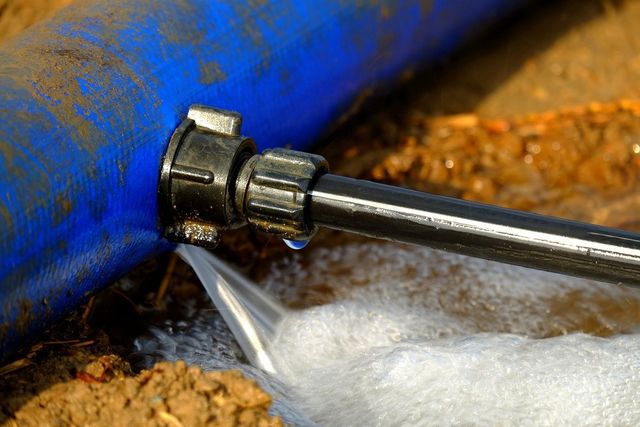Just how to Locate and Repair Service Water Leaks-- A Comprehensive Overview
Just how to Locate and Repair Service Water Leaks-- A Comprehensive Overview
Blog Article
Right here below yow will discover lots of first-rate points relating to Locating water leaks.

Early detection of leaking water lines can mitigate a prospective disaster. Some small water leakages might not be noticeable.
1. Check Out the Water Meter
Every residence has a water meter. Examining it is a proven way that aids you discover leaks. For starters, shut off all the water resources. Make certain no person will certainly purge, utilize the faucet, shower, run the cleaning equipment or dish washer. From there, go to the meter as well as watch if it will certainly change. Since no person is using it, there should be no movements. That shows a fast-moving leak if it relocates. Similarly, if you discover no changes, wait an hour or two and also examine back once more. This indicates you might have a slow-moving leakage that can also be underground.
2. Examine Water Usage
If you identify abrupt modifications, despite your usage being the same, it indicates that you have leakages in your plumbing system. An abrupt spike in your bill suggests a fast-moving leakage.
Meanwhile, a consistent rise on a monthly basis, even with the same practices, reveals you have a sluggish leak that's also slowly intensifying. Call a plumber to extensively inspect your property, especially if you feel a warm location on your flooring with piping beneath.
3. Do a Food Coloring Test
When it comes to water consumption, 30% originates from commodes. Examination to see if they are running appropriately. Decrease specks of food color in the container and also wait 10 mins. There's a leak in between the storage tank and also dish if the color in some way infiltrates your bowl during that time without flushing.
4. Asses Exterior Lines
Do not fail to remember to inspect your outside water lines too. Must water seep out of the link, you have a loose rubber gasket. One little leakage can squander loads of water and also spike your water costs.
5. Assess the circumstance and also examine
Home owners should make it a behavior to inspect under the sink counters and even inside closets for any type of bad odor or mold growth. These two warnings indicate a leakage so prompt interest is called for. Doing routine assessments, also bi-annually, can save you from a significant trouble.
Much more significantly, if you recognize your home is currently old, keep a watchful eye on your heating units, tubes, pipes and so on. Look for discolorations and damaging as most home appliances as well as pipelines have a life span. They will certainly also naturally degrade because of damage. If you think dripping water lines in your plumbing system, do not await it to rise. Call an expert plumber today so you don't end up with an awful mess in your home.
Early discovery of leaking water lines can mitigate a potential disaster. Some tiny water leakages might not be noticeable. Inspecting it is a guaranteed way that aids you uncover leakages. One tiny leak can squander heaps of water and surge your water costs.
If you presume leaking water lines in your plumbing system, do not wait for it to rise.
5 Signs that Your Home Has a Hidden Leak
Your water bill is unusually high without explanation
Generally, your water bill tends to stay consistent throughout the year as long as the same number of people live in your household year round. The bill might be higher during certain times of the year, such as summer, when your lawn may require more watering than it does in cooler months. However, if you notice a rise in your water bill that you can’t explain, it’s an indicator that there’s a hidden leak somewhere in your home.
You hear running water
One of the biggest signs that you have a water leak is the sound of rushing water when no plumbing fixtures are on and when no water-using appliances are running. If you hear running water in your walls when no water is being used anywhere in your home, locate your home’s main water shut-off valve, shut off your water supply, and contact a plumber at once.
Your home smells musty
Hidden leaks often occur in dark spaces, such as behind walls or under carpeting. Incidentally, darkness and moisture can create an ideal breeding environment for mold or mildew. If you start to smell mildew or the scent of rotting wood or stagnant water around your home, it’s a fair bet that a leak is the culprit.
You find wet spots around your home
The wet spots usually show up as moist areas in your carpeting. If your home has a basement level, puddles on the floor could indicate a slab leak. Outside, unexplainable puddles or lush, green patches in your yard often mean that there’s a leak in your sewer line or main water line.
You have stains, bubbles, or condensation on your walls/ceiling
Stains or condensation on your walls or ceiling are both major signs of a hidden leak. Also, drywall (AKA. sheetrock) is very absorbent, and as it takes on more water from a leak behind a wall, it will start to bubble, swell, or warp. If you see this happening in your home, don’t wait to contact a plumber before the water damage spreads.
https://www.ezflowplumbingaz.com/blog/2019/june/5-signs-that-your-home-has-a-hidden-leak/

As a passionate reader on Locating water leaks, I imagined sharing that post was smart. Sharing is good. One never knows, you may just be helping someone out. Thanks a lot for your time. Kindly come visit our website back soon.
Report this page